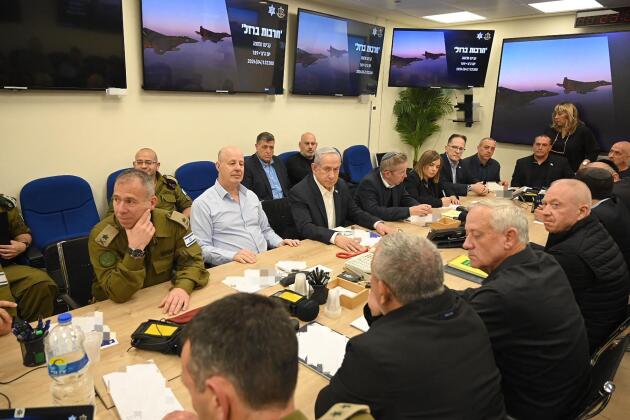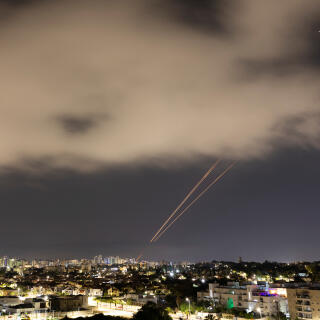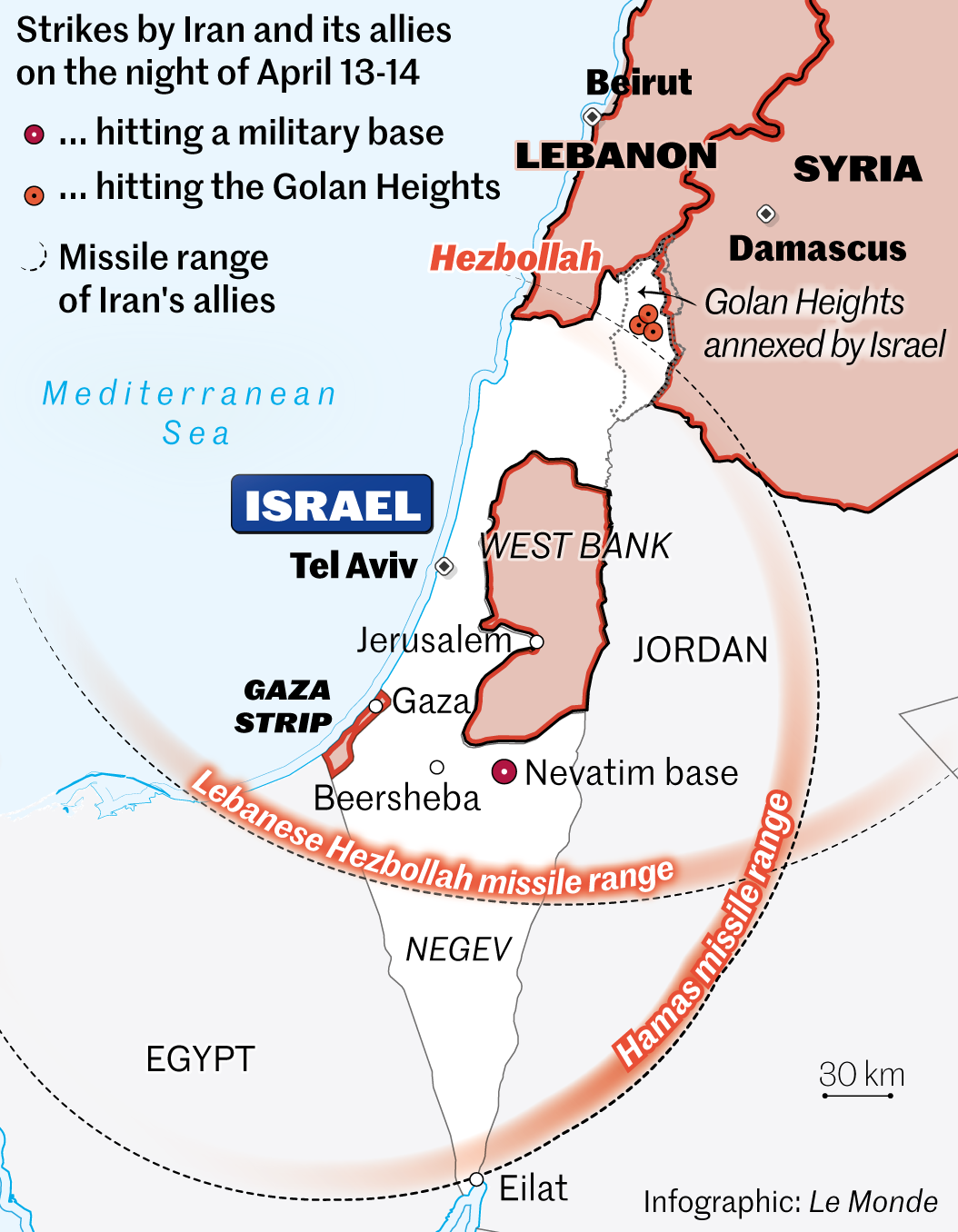On the night of Saturday, April 13, to Sunday, April 14, Iran launched 300 drones and missiles from its territory toward Israel. Tehran's attack was unprecedented since the creation of the Israeli state in 1948. For several hours, the skies over Jerusalem, the Golan Heights and the southern Negev were streaked with light trails left by interceptor missiles fired by the Iron Dome and some of Israel's allies.
The offensive was carried out in response to an airstrike on the Iranian consulate in Damascus, Syria, on April 1, which the Iranian regime blames on Israel. Sixteen people were killed in the attack, including two generals of the Revolutionary Guards, the Iranian regime's ideological army. The following day, Iran's supreme leader, Ayatollah Ali Khamenei, pledged that Israel would be "punished." Here is a look back at 10 key moments in the operation, dubbed "Honest Promise" by Iran.
Saturday, April 13, 10:45 am: Iran seizes ship "affiliated" with Israel
Iranian Revolutionary Guards maritime special forces seize the container ship MSC Aries, a hundred kilometers north of the Emirati city of Fujairah. While dozens of attacks have been carried out in the Red Sea and Gulf of Aden against merchant ships since the start of the war between Israel and Hamas, until now, they had been claimed by the Yemeni Houthi rebels.
According to IRNA, the official Iranian news agency, the MSC Aries was boarded because this ship "flying the Portuguese flag" is "managed by the Zodiac company, which belongs to the Zionist capitalist Eyal Ofer." Israel is frequently described as "the Zionist regime" in Iran, which does not recognize the existence of this state.
Saturday, 11:12 pm: The Israeli army reports that Iranian drones have been launched toward its territory
"A short while ago, Iran launched UAVs [drones] from within its territory toward Israel," the Israeli army communicates on its Telegram account. In a televised address, army spokesman Daniel Hagari says they were "closely monitoring Iranian killer drones that are en route to Israel sent by Iran. This is a severe and dangerous escalation." He goes on to say that "together with our partners, the Israeli Defense Forces is operating at full force to defend the state of Israel and the people of Israel."
Saturday, around 11:45 pm: Iran confirms the attack, named "Honest Promise"
"In response to the Zionist regime’s numerous crimes, including the attack on the consular section of Iran’s embassy in Damascus and the martyrdom of a number of our country's commanders and military advisors in Syria, the IRGC's [Islamic Revolutionary Guards Corps] Aerospace Division launched tens of missiles and drones against certain targets inside the occupied territories," state TV quotes the IRGC's public relations department as saying.
The operation, dubbed "Honest Promise," is launched. Within minutes of the attack beginning, the X account of Iran's supreme leader, Ayatollah Ali Khamenei, republishes a message stating, "The malicious regime will be punished."
Around midnight: Israel announces the closure of its airspace
"In accordance with security instructions, Israel's airspace will be closed to international and domestic flights from 12:30 this evening," says the Israel Airports Authority. At the same time, Iraq, which borders Iran and Lebanon, Israel's neighbor, announces the closure of their airspace and the suspension of air traffic. An hour earlier, Jordan had announced the temporary closure of its airspace in the face of "mounting dangers."
Sunday, April 14, around 12:20 am: Israel announces war cabinet meeting

The head of the Israeli government, Benjamin Netanyahu, convenes a meeting of his war cabinet, made up of his General Staff and his closest security associates, including Defense Minister Yoav Gallant and Benny Gantz, a minister without portfolio and member of his coalition government, in a secure room in Tel Aviv. After the meeting, Netanyahu speaks with Joe Biden, who in turn holds a crisis meeting in Washington with his top officials.
Sunday, around 12:45 am: Houthis and Hezbollah launch attacks on Israel
British maritime security company Ambrey reports that the Houthis have launched drones toward Israel in "coordination" with Iran. "Israeli ports are assessed to be potential targets," the company adds, warning of possible "collateral damage" to ships.
Hezbollah announces that it shelled an Israeli military position on the occupied Golan Heights. In a statement, the pro-Iranian Shiite movement, which has been carrying out almost daily attacks against Israel for over six months, says it fired "dozens of Katyusha rockets" at an Israeli barracks in the Israeli-occupied Syrian Golan.
Sunday, 1:06 am: Iranian diplomats call the "matter" of the Damascus strike "concluded" from their point of view
The Iranian mission to the United Nations (UN) explains that "conducted on the strength of Article 51 of the UN Charter pertaining to legitimate defense, Iran's military action was in response to the Zionist regime's aggression against our diplomatic premises in Damascus," in a message posted on X.
"The matter can be deemed concluded," states the diplomatic representation. "However, should the Israeli regime make another mistake, Iran's response will be considerably more severe. It is a conflict between Iran and the rogue Israeli regime, from which the US MUST STAY AWAY!"
Sunday, 1:42 am: The first warning sirens sound in Israel
Fired several hours earlier from Iran, whose closest border is almost 900 kilometers from Israel, drones and missiles appear in the skies over Israel.
Initially concentrated in the northern and southern Negev, alerts are heard in Jerusalem, three minutes later (1:45 am). Explosions in the sky, due to Israel firing missile intercepts as part of its Iron Dome defensive system, are also heard by journalists on the scene.
Sunday, around 1:45 am: Explosions in the skies over Damascus and Beirut
Detonations ring out during the night in Damascus, Syria, and Beirut, Lebanon, two of Israel's neighbors, according to Agence France-Presse journalists. In Lebanon, at least two explosions sound in the skies over the capital Beirut. Another journalist in the Beqaa Valley, a region in the east of the country bordering Syria, also reports hearing several detonations.
The Syrian Observatory for Human Rights claims that other explosions sounded in the skies over Damascus and also in other central cities and on the Syrian coast. The NGO adds that the explosions were due to Syrian anti-aircraft defense activated against Israeli drones and missiles attempting to intercept Iranian missiles.
According to information obtained by Le Monde, several Iranian vectors were also intercepted over French holdings located in Iraq and Jordan. "France has ground-air defense elements in the region to protect its forces, and they were used to neutralize what flew over our holdings," confirms an anonymous source familiar with the matter.
Sunday, 8:59 am: "99% of the threats launched against Israeli territory have been intercepted," says the Israeli army
In a morning address, Israeli army spokesman Daniel Hagari assures that "99%" of "300 threats of various types [170 drones, 30 cruise missiles and 110 ballistic missiles]," have been intercepted. "Only a few fell on Israeli territory," according to Hagari, notably at the Nevatim air base in the Negev. The Israeli army has so far reported only one serious injury: a 7-year-old girl hit in the head by shrapnel from a shell launched to intercept an Iranian projectile.
At Israel's request, the UN Security Council is expected to hold an emergency meeting on Sunday. UN Secretary General Antonio Guterres condemns "a serious escalation," as do many European capitals, including France and Germany. Early Sunday afternoon, the heads of state and government of the G7 (Canada, France, Germany, Italy, Japan, the United Kingdom, the United States and the European Union) are also meeting "to discuss Iran's attack on Israel," announces the Italian government, which currently chairs this group of industrialized countries.

